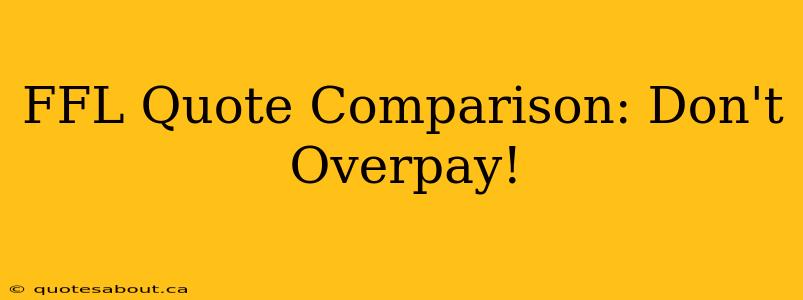Finding the right firearms license (FFL) can be a crucial step in your journey as a gun owner. But with so many different FFL holders out there, how do you ensure you're getting the best price without sacrificing quality service? This guide will walk you through comparing FFL quotes and help you avoid overpaying. We'll explore various factors to consider and provide actionable steps to make an informed decision.
What is an FFL and Why is Comparison Shopping Crucial?
A Federal Firearms License (FFL) is required for anyone legally involved in the business of manufacturing, importing, exporting, or dealing in firearms. When you purchase a firearm online or from a private seller out of state, you need to have the firearm shipped to an FFL holder in your area, who will then conduct the necessary background check and transfer the firearm to you.
Comparing quotes from multiple FFLs is essential because their fees can vary significantly. Price discrepancies arise from factors like location, services offered, and business overhead. A quick comparison can save you money – sometimes a substantial amount.
What Factors Influence FFL Transfer Fees?
Several key factors impact the cost of an FFL transfer:
- Location: FFL holders in high-demand areas or those with higher operating costs might charge more.
- Services Offered: Some FFLs provide additional services such as gun cleaning, storage, or even gunsmithing, which can inflate their transfer fees.
- Type of Firearm: The type of firearm being transferred (handgun, rifle, shotgun) can sometimes influence the fee, although this is less common.
- Volume of Transfers: FFLs that handle a high volume of transfers might offer slightly lower rates due to economies of scale.
How Much Should an FFL Transfer Cost?
There's no single definitive answer to this question. However, a reasonable range for a standard FFL transfer fee is between $25 and $75. Anything significantly above $75 warrants further investigation. Always inquire about any additional fees beyond the standard transfer cost.
What are the common additional fees charged by FFL holders?
Many FFLs charge additional fees for specific services. These can include:
- NICS Background Check Fee: This is a federal fee required for all firearm transfers, and it is usually a separate charge on top of the FFL transfer fee. This fee is mandated by the government, not set by the FFL.
- Storage Fees: If you need to store your firearm at the FFL's facility for an extended period, expect storage fees.
- Administrative Fees: Some FFLs include an additional administrative fee to cover their processing costs.
How to Find and Compare FFL Quotes: A Step-by-Step Guide
- Use Online Directories: Several websites offer directories of FFL holders. Search for "FFL near me" and check multiple sites for a broader range of options.
- Check Reviews: Look for online reviews on Google, Yelp, or other platforms to gauge the reputation and customer service of potential FFLs.
- Contact Multiple FFLs: Call or email several FFL holders in your area, providing details about the firearm you're transferring. Be clear about your needs and inquire about their transfer fees, including any additional charges.
- Compare Quotes Side-by-Side: Create a spreadsheet to compare quotes, listing each FFL's name, address, transfer fee, additional fees, and any additional services offered. This will make it easy to spot the best value.
- Choose the Best Option: Select the FFL that offers the best combination of price, service, and convenience.
Are there any hidden costs I should be aware of when choosing an FFL?
While most FFLs are upfront about their fees, it's crucial to explicitly ask about all potential charges. Hidden or unexpected costs can significantly increase the overall expense. Be sure to inquire about:
- Waiting periods: Some FFLs might have extended waiting periods, leading to inconvenience and potential additional fees.
- Appointment requirements: Some FFL holders might require appointments, while others operate on a walk-in basis.
- Payment methods: Confirm what payment methods are accepted (cash, check, credit card) as some may charge additional fees for certain payment options.
By following these steps and understanding the factors that influence FFL transfer fees, you can successfully compare quotes and ensure you're not overpaying for your firearm transfer. Remember, a little research can save you significant money!

